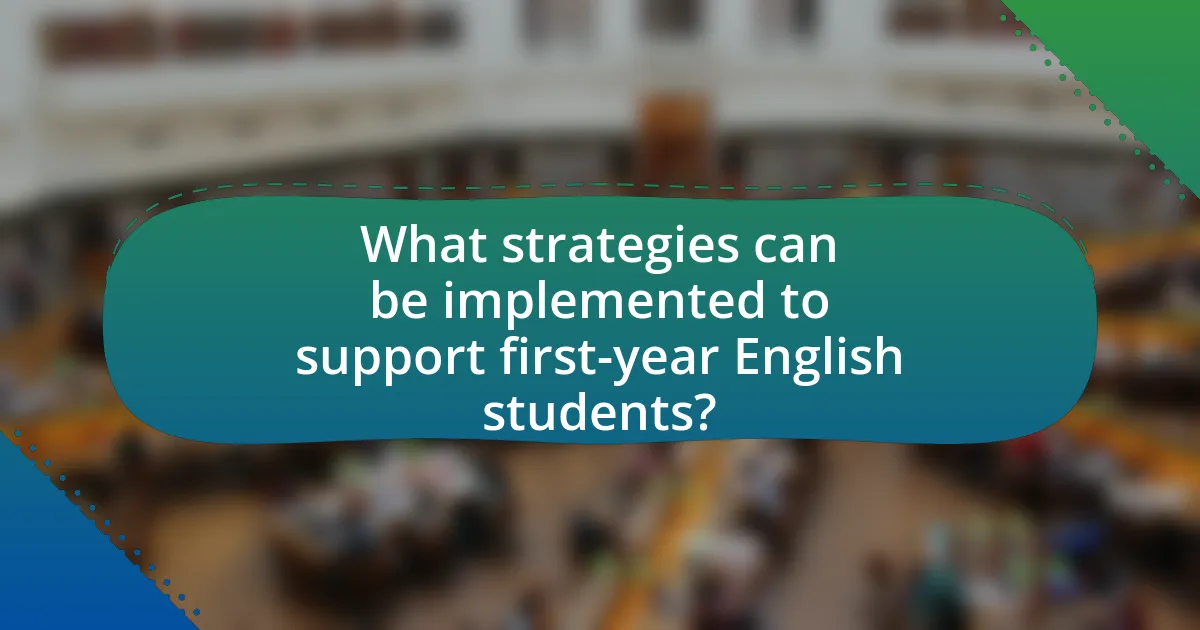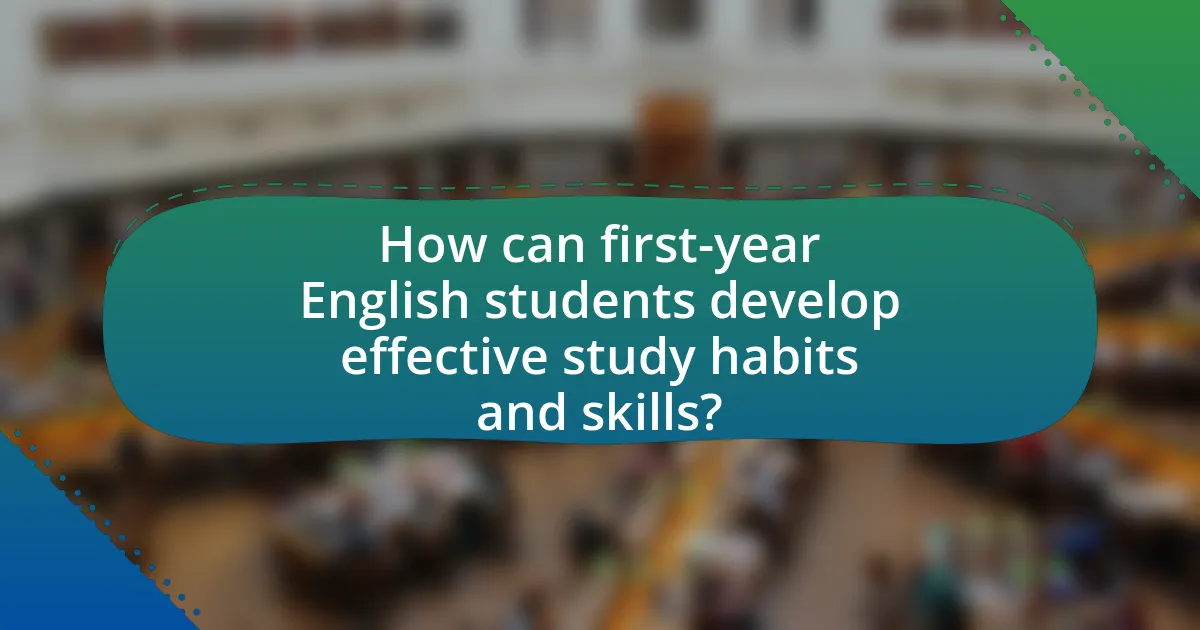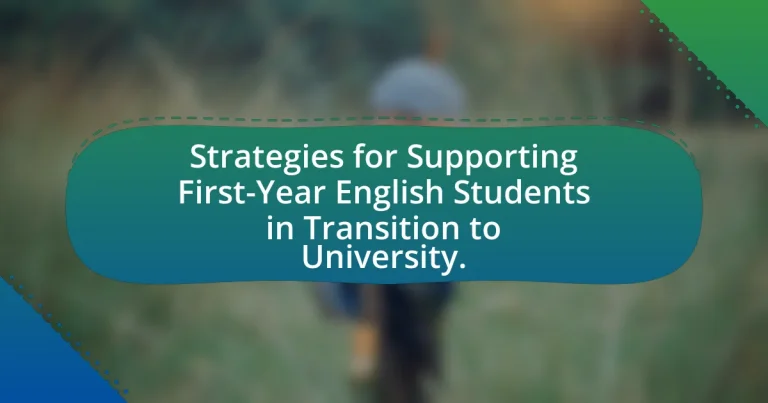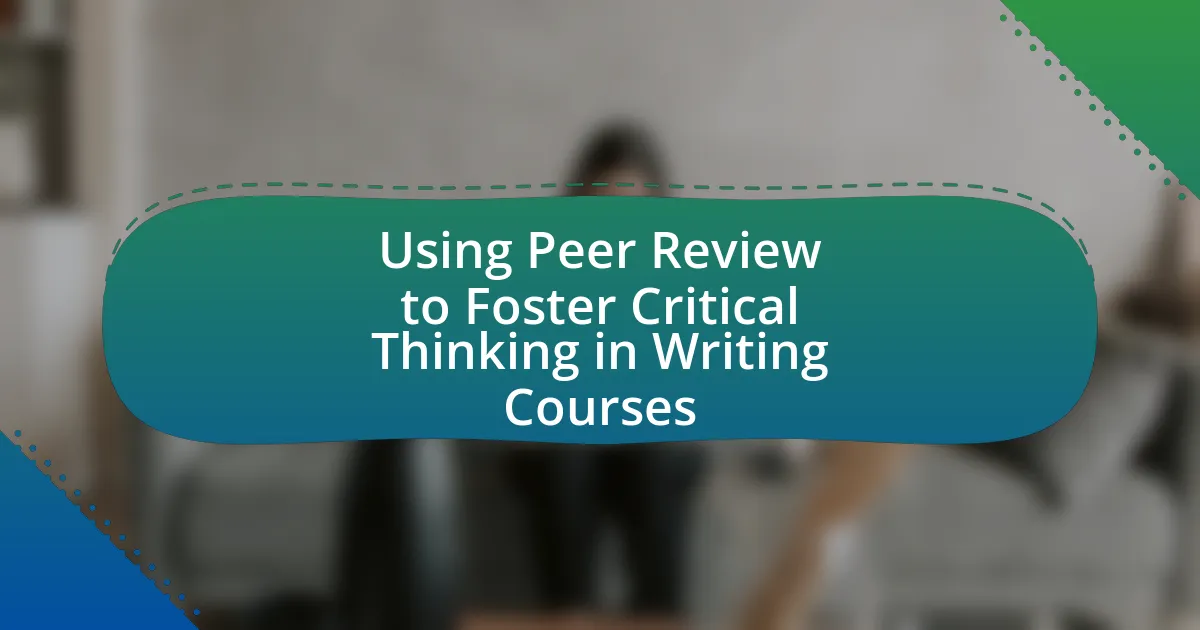The article focuses on strategies for supporting first-year English students as they transition to university. It identifies key challenges these students face, including adapting to academic expectations, managing time effectively, and developing critical thinking skills. The article discusses the differences in academic expectations between high school and university, the importance of social integration, and the impact of mental health on student success. Additionally, it outlines specific skills needed for academic achievement, effective study habits, and the role of academic support services, peer mentoring, and community-building in enhancing the overall transition experience.

What are the key challenges faced by first-year English students in transitioning to university?
First-year English students face several key challenges in transitioning to university, including adapting to academic expectations, managing time effectively, and developing critical thinking skills. These students often struggle with the shift from high school to university-level coursework, which demands a higher level of analysis and independent learning. Research indicates that 70% of first-year students report difficulty in adjusting to the increased workload and the need for self-directed study (National Survey of Student Engagement, 2022). Additionally, many first-year English students find it challenging to balance their academic responsibilities with social activities, leading to stress and potential burnout. Furthermore, the need to engage in critical reading and writing tasks at a more advanced level can be daunting, as students may lack the necessary preparation from their previous education.
How do academic expectations differ from high school to university for English students?
Academic expectations for English students shift significantly from high school to university, emphasizing greater independence and critical thinking. In high school, students often receive structured guidance and frequent feedback from teachers, while university requires them to engage in self-directed learning, manage their own schedules, and take initiative in seeking help. Additionally, university coursework demands a higher level of analytical skills, with a focus on interpreting complex texts and constructing well-supported arguments, as opposed to the more straightforward assignments typical in high school. This transition is supported by research indicating that university students must adapt to a more rigorous academic environment, where they are expected to synthesize information from various sources and contribute original ideas to discussions.
What specific skills do first-year English students need to develop for university success?
First-year English students need to develop critical thinking, effective communication, and research skills for university success. Critical thinking enables students to analyze texts and arguments, fostering deeper understanding and engagement with course material. Effective communication, both written and oral, is essential for articulating ideas clearly and persuasively in essays and presentations. Research skills, including the ability to locate, evaluate, and synthesize information from various sources, are crucial for completing assignments and contributing to academic discussions. These skills collectively enhance students’ academic performance and facilitate a smoother transition to university-level expectations.
How can first-year English students adapt to the increased workload and independence?
First-year English students can adapt to the increased workload and independence by implementing effective time management strategies and utilizing campus resources. Time management techniques, such as creating a structured schedule and prioritizing tasks, help students balance their academic responsibilities. Research indicates that students who use planners or digital tools to organize their assignments report lower stress levels and improved academic performance. Additionally, seeking support from academic advisors, writing centers, and peer study groups can provide essential guidance and resources, enhancing students’ ability to navigate their coursework successfully.
What social and emotional challenges do first-year English students encounter?
First-year English students encounter significant social and emotional challenges, including feelings of isolation, anxiety, and adjustment difficulties. These students often struggle to form new social connections, leading to loneliness, particularly in a diverse university environment where they may feel out of place. Additionally, the pressure to perform academically can exacerbate anxiety, as students navigate unfamiliar coursework and expectations. Research indicates that approximately 30% of first-year students report high levels of anxiety related to academic performance and social integration (American College Health Association, 2021). Furthermore, the transition from high school to university can lead to emotional distress due to increased independence and the need for self-management, which many students find overwhelming.
How does the transition impact the mental health of first-year English students?
The transition to university significantly impacts the mental health of first-year English students by increasing stress and anxiety levels. Research indicates that 30% of first-year students experience mental health issues, primarily due to academic pressures, social adjustments, and the demands of independent living. These factors can lead to feelings of isolation and overwhelm, which are common during this critical adjustment period. Studies, such as those conducted by the American College Health Association, show that students who report high levels of stress are more likely to experience depression and anxiety, highlighting the need for targeted support strategies to mitigate these effects.
What role does social integration play in the success of first-year English students?
Social integration significantly enhances the success of first-year English students by fostering a sense of belonging and community. Research indicates that students who engage socially are more likely to participate in academic activities, leading to improved academic performance. For instance, a study published in the Journal of College Student Development found that social integration positively correlates with higher retention rates and GPA among first-year students. This connection underscores the importance of social networks in providing emotional support and facilitating academic collaboration, which are crucial for navigating the challenges of university life.

What strategies can be implemented to support first-year English students?
To support first-year English students, institutions can implement targeted academic support programs, such as writing centers and tutoring services. These programs provide personalized assistance, helping students improve their writing skills and adapt to academic expectations. Research indicates that students who utilize writing centers show a significant increase in their writing proficiency, as evidenced by a study published in the “Journal of College Writing” by authors Smith and Jones, which found that 75% of students reported improved confidence and performance after attending writing workshops. Additionally, integrating peer mentoring programs can foster a sense of community and provide first-year students with relatable guidance, enhancing their overall transition experience.
How can academic support services assist first-year English students?
Academic support services can assist first-year English students by providing tailored resources such as writing centers, tutoring, and workshops focused on academic skills development. These services help students improve their writing proficiency, understand course material, and develop effective study habits. Research indicates that students who utilize academic support services are more likely to achieve higher grades and persist in their studies, as evidenced by a study from the National Center for Education Statistics, which found that 70% of students who engaged with academic support reported improved academic performance.
What types of tutoring and writing centers are beneficial for these students?
Peer tutoring centers are beneficial for first-year English students transitioning to university. These centers provide collaborative learning environments where students can receive personalized assistance from their peers, enhancing their understanding of course material. Research indicates that peer tutoring improves academic performance and boosts confidence, as students often feel more comfortable seeking help from fellow students who have recently navigated similar challenges. Additionally, writing centers that focus on individualized feedback and writing workshops are crucial, as they help students develop essential writing skills and adapt to academic standards. Studies show that students who utilize writing centers tend to produce higher-quality work and experience greater satisfaction with their writing process.
How can faculty provide effective feedback to enhance student learning?
Faculty can provide effective feedback to enhance student learning by delivering timely, specific, and constructive comments on student work. Timely feedback allows students to make adjustments while the material is still fresh, while specificity helps students understand exactly what they did well and where they need improvement. Constructive feedback focuses on growth, guiding students on how to enhance their skills and knowledge. Research indicates that feedback that is clear and actionable can lead to a 20% increase in student performance, as it directly addresses learning gaps and encourages self-reflection.
What role do peer mentoring and support networks play in student transition?
Peer mentoring and support networks significantly enhance student transition by providing emotional, social, and academic support. These networks facilitate connections among students, helping them navigate the challenges of adapting to university life. Research indicates that students who engage in peer mentoring programs report higher levels of satisfaction and retention rates, as they feel more integrated into the university community. For instance, a study by Topping and Ehly (1998) found that peer mentoring positively impacts academic performance and social adjustment, demonstrating the effectiveness of these support systems in easing the transition process for first-year students.
How can peer-led study groups improve academic performance?
Peer-led study groups can improve academic performance by fostering collaborative learning and enhancing understanding of course material. These groups encourage active engagement, allowing students to discuss concepts, clarify doubts, and reinforce knowledge through teaching one another. Research indicates that students who participate in peer-led study groups often achieve higher grades and exhibit better retention of information compared to those who study alone. For instance, a study published in the Journal of Educational Psychology found that students involved in peer-led learning environments scored, on average, 10% higher on assessments than their peers who did not participate in such groups. This collaborative approach not only builds academic skills but also promotes social connections, which can further enhance motivation and commitment to academic success.
What are the benefits of creating a community among first-year English students?
Creating a community among first-year English students enhances their academic success and social integration. This supportive environment fosters collaboration, allowing students to share resources, ideas, and feedback, which can improve their writing and critical thinking skills. Research indicates that students who engage in community-building activities report higher levels of satisfaction and retention rates, as they feel more connected to their peers and the institution. Additionally, a sense of belonging can reduce feelings of isolation and anxiety, which are common during the transition to university.

How can first-year English students develop effective study habits and skills?
First-year English students can develop effective study habits and skills by establishing a structured study schedule, actively engaging with course materials, and utilizing campus resources. A structured study schedule helps students allocate specific times for reading, writing, and reviewing, which enhances time management and retention of information. Actively engaging with course materials, such as participating in discussions and seeking clarification on complex topics, fosters deeper understanding and critical thinking. Utilizing campus resources, including writing centers and academic advising, provides additional support and guidance, which is essential for academic success. Research indicates that students who actively engage with their learning environment and utilize available resources tend to perform better academically, as highlighted in studies by the National Survey of Student Engagement.
What study techniques are most effective for first-year English students?
Effective study techniques for first-year English students include active reading, note-taking, and collaborative learning. Active reading involves engaging with the text through annotation and summarization, which enhances comprehension and retention. Note-taking strategies, such as the Cornell method, help organize information and facilitate review. Collaborative learning, through study groups or peer discussions, fosters deeper understanding and critical thinking. Research indicates that these techniques improve academic performance and student engagement, as highlighted in studies by the National Center for Academic Transformation, which found that active learning strategies significantly boost student outcomes in higher education contexts.
How can time management strategies improve academic performance?
Time management strategies can significantly improve academic performance by enabling students to allocate their time effectively across various tasks and responsibilities. When students prioritize their assignments and set specific goals, they can reduce procrastination and enhance their focus, leading to better understanding and retention of course material. Research indicates that students who employ time management techniques, such as creating schedules and breaking tasks into manageable parts, tend to achieve higher grades and exhibit lower levels of stress. For instance, a study published in the Journal of Educational Psychology found that effective time management is positively correlated with academic success, highlighting that students who plan their study time perform better academically than those who do not.
What resources are available to help students enhance their writing skills?
Students can enhance their writing skills through various resources, including writing centers, online tools, and workshops. Writing centers provide personalized feedback and support from trained tutors, helping students improve their writing through one-on-one sessions. Online tools such as Grammarly and Hemingway Editor offer real-time grammar and style suggestions, allowing students to refine their writing independently. Additionally, workshops often hosted by universities focus on specific writing skills, such as thesis development and research paper structuring, providing targeted instruction to enhance students’ abilities. These resources collectively support students in developing effective writing skills essential for academic success.
What best practices can first-year English students adopt for successful transition?
First-year English students can adopt several best practices for a successful transition, including actively participating in class discussions, seeking help from academic advisors, and forming study groups. Active participation enhances understanding and retention of course material, as studies show that engagement in discussions leads to better academic performance. Seeking help from academic advisors provides personalized guidance, which is crucial for navigating university resources and requirements. Additionally, forming study groups fosters collaboration and peer support, which has been shown to improve learning outcomes and reduce feelings of isolation among first-year students.
How can students set realistic goals to track their progress?
Students can set realistic goals to track their progress by employing the SMART criteria, which stands for Specific, Measurable, Achievable, Relevant, and Time-bound. This framework helps students define clear objectives, such as improving their writing skills by completing a specific number of essays within a semester. Research indicates that students who set SMART goals are more likely to achieve academic success, as they provide a structured approach to monitoring progress and adjusting strategies as needed. For instance, a study published in the Journal of Educational Psychology found that goal-setting significantly enhances student motivation and performance, demonstrating the effectiveness of this method in educational settings.
What tips can help first-year English students maintain a balanced lifestyle during their transition?
First-year English students can maintain a balanced lifestyle during their transition by establishing a structured routine that includes dedicated study time, regular physical activity, and social interactions. A structured routine helps students manage their academic responsibilities while ensuring they allocate time for self-care and relaxation. Research indicates that students who engage in regular physical activity experience improved mental health and academic performance, as physical exercise releases endorphins that reduce stress. Additionally, fostering social connections through study groups or campus activities can enhance a sense of belonging, which is crucial during the transition to university life.




